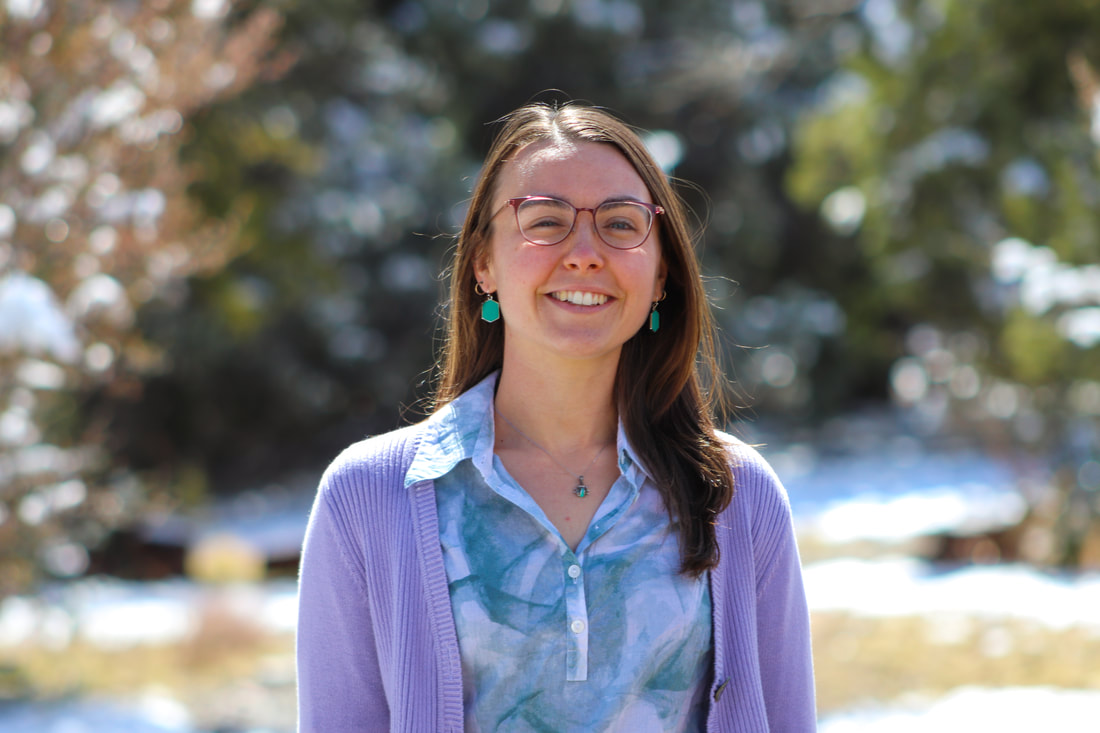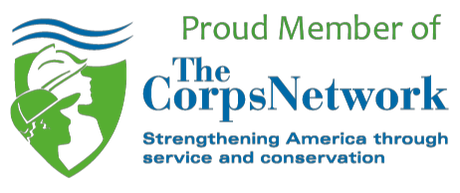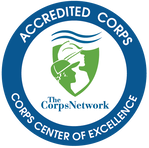|
Ellen Snyder grew up in the suburbs of Chicago, Illinois and when not reading, she was outdoors experiencing nature. Growing up, her science teachers in middle and high school made biology, chemistry, and physics fun and interesting. This made Ellen a curious student, always looking for more to learn. One fond memory she has is of her eighth-grade science teacher who always said, “Never say ‘eww’ when in my class, I only want to hear ‘ooh’ and ‘ahh.’”
Her parents emphasized gardening, recycling, and believed she and her brother should be outdoors as much as possible. Being a bookworm, her mom would tell Ellen to read outside to get some sunshine. Ellen was also often outdoors playing with her brother and attending classes about geology and local animals at the nature center in town. She also was a Girl Scout through high school, which introduced her to camping and hiking. Living in a suburban area these experiences out in the wilderness helped her connect even more to the Earth. As she got older, she began to better understand the impact humans have on the natural world and that it is our responsibility to care for the land, water, plants, animals, microorganisms, and all other inhabitants of the Earth. Ellen finds that people within the science, technology, engineering, and mathematics (STEM) fields are so passionate, intelligent, and creative; they’re always willing to talk about their field of expertise and give advice. This was especially true within Ellen’s educational and professional experiences. She had professors, coworkers, and classmates that gave her a new perspective on conservation, agriculture, and sustainability. After high school, she attended the local community college, Harper College, and received an Associate of Arts. Ellen then attended Monmouth College, a small liberal arts school on the western edge of Illinois, to earn a Bachelor of Arts in Environmental Science. She always knew she wanted to pursue a degree in biology, but it wasn’t until her sophomore year of college after an ecology course with an inspirational professor that Ellen realized environmental science was the direction in which she was meant to go. While attending college Ellen was a member of the environmental club, President of a student-run organic educational garden, conducted rare fern research as a senior, and assisted in prescribed burns near campus. Ellen also worked several restoration-based jobs during her summers while attending college, including assisting with a ten-year biodiversity project to restore native plant species to former farmland and removing non-native plant species from forest preserves. She credits these summer experiences to really giving her an edge when applying for opportunities after graduation. Ellen’s other job experience includes: being the only female crew leader at a landscaping company, a medical laboratory technician, agricultural soil analyst, and medical cannabis cultivator. One of the most difficult things Ellen had to realize after graduation was that life plans can change, whether that is because of moving to a new state or a pandemic, but the best way to move forward is to keep trying new things. Finding AmeriCorps and becoming a team member within GEM Environmental has given Ellen a new perspective on what she wants to do with her time. This term with AmeriCorps has also emphasized the importance of education for younger students and has given Ellen confidence in teaching. She finds the students she works with to be inquisitive and she especially enjoys the wonderful conversations she has with them about the natural world. Ellen has brought to GEM her knowledge of biological and ecological concepts to help create lesson plans for the K-6th grade students at the Community Nature Center (CNC). The lessons at the CNC focus on providing nature-based education to students during COVID-19 who do not have access to technology nor a safe place to learn when school is not in session. She also assists with projects concerning native plant species and worked with Madison Link to create a presentation to assist teachers in educating their students about invasive plants in Arizona for the Summer Institute hosted by the Center for Nature and Place through Prescott College. Ellen believes accessibility to STEM fields, no matter someone’s socioeconomic or geographic background, is essential. STEM fields make up such a large portion of the world around us, whether it’s nature where you have a picnic, the tablet you watch movies on, the medical equipment that saves lives, or the calculations that sent a rover to look for ancient life on Mars, all these fields of study are so important. When Ellen isn’t helping with GEM’s programs she enjoys exploring and hiking in the Prescott area, reading science fiction novels, baking interesting dessert recipes, spending time with her husband, dog, and cat, and learning how to garden in the high desert! If you have any questions for Ellen, she can be reached at [email protected]. She would be happy to talk about GEM’s programs, what it’s like to pursue a career in science, or how great plants are! |
Categories
All
Archives
June 2024
|
G.E.M. Environmental NFP
Geology - Engineering - Minerals - Environmental - Not for Profit
Geology - Engineering - Minerals - Environmental - Not for Profit
Community Partners
|
Programs
|
Get Involved
|
About
|
Follow Us
|
Sponsors & Donors
|
© COPYRIGHT 2017 - 2023. ALL RIGHTS RESERVED. G.E.M. Environmental NFP
GEM Environmental, GEM4STEM, GEM Corps, and Charity Rocks are all Registered Trademarks of G.E.M. Environmental NFP.
Any and all use of Trademarks or Copyrights must be authorized.
GEM Environmental, GEM4STEM, GEM Corps, and Charity Rocks are all Registered Trademarks of G.E.M. Environmental NFP.
Any and all use of Trademarks or Copyrights must be authorized.

 RSS Feed
RSS Feed


